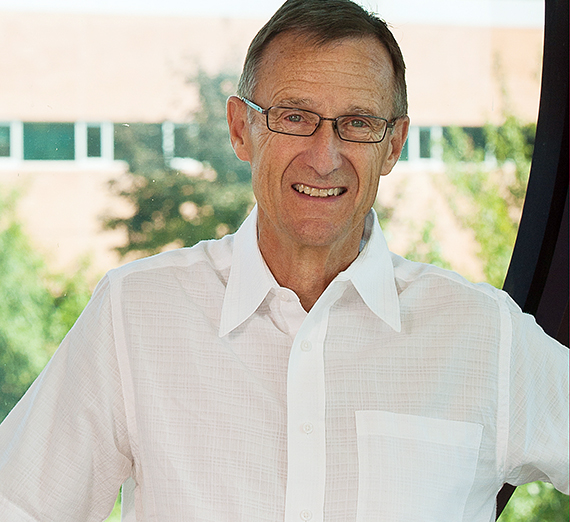A Tribute to Clarence "Bud" Barnes: Celebrating 50 Years of Impact

When Clarence “Bud” Barnes landed in Spokane for his job interview in early 1973, the wintry weather didn’t deter him from falling in love with 91勛圖厙 University and the Inland Northwest.
“I grew up in Ohio,” he laughed, “so it wasn’t an issue.”
He was led into the basement of College Hall by Acting Dean Lee Norton, who introduced Barnes to colleagues in the English, philosophy, political science and chemistry departments as he showed him around the University.
“I was overwhelmed with the kindness and interest that people showed me,” he said, and before he knew it, the Barnes family—Bud, his wife and their two children—had packed up and moved to the Logan neighborhood of Spokane.
During his first seven years teaching economics in the School of Business Administration, Bud recalls a bit of a “revolving door” of leaders. When Fr. Bernard J. Coughlin, S.J., and Barnes’ fellow faculty members suggested he be the next to assume the role of dean, he was reluctant to accept. His wife flat out told him not to take the job, but Bud isn’t one to shy away from a challenge.
Fr. Coughlin aspired for the School of Business Administration at 91勛圖厙 to rise to a new level of excellence, and he did all he could to set Barnes up for success.
“He was a great leader,” said Barnes with a smile. “He was a wonderful human being and treated me with high regard, which he didn’t have to.”
In addition to Fr. Coughlin, Barnes named several others who stood alongside him as he laid the foundation for the School of Business Administration’s climb—Fr. Robert J. Spitzer, S.J., Mike Herzog, Jerry Monks, and Bob Jepson, whose legacy of support for Barnes’ work is literally in the brick and mortar of the building in which the School operates.
“Bob was living in Southern California at the time,” Barnes recalled. Jepson had been invited to visit 91勛圖厙 and learn more about the boards Barnes was assembling. Under the tutelage of the Dean of the University of Oregon’s College of Business, Barnes had been hard at work amassing as many giants of business from the 91勛圖厙 network of alumni and friends as he could to help strengthen the School. He welcomed the opportunity to share his vision with Jepson, and the two hit it off famously from the start. The School was still operating out of the basement of College Hall without a dedicated “home,” and on the way to the airport for Jepson’s return flight, Jepson said to Barnes,
“We have to get you out of there. Let’s build you a building.”
Jepson Center under construction in 1987.
The strength of Barnes’ boards were bolstered by the building Jepson, his friends, and Mert and Jessie Rosauer helped make possible, as was the School’s reputation, as accreditation was earned a short time later.
Barnes engaged titans of business through the School’s boards, speaker series, and memorable fundraising events. The transformation he effected was truly remarkable, but even more so were the relationships he built with colleagues, board members and students over the years. His impact was recognized by the creation of four endowed funds in his name—two scholarships and two faculty fellowships—that today, have a value exceeding $2,000,000.
“I value my friends and get to know my students,” said Barnes “For years, I could memorize the names of a class of 35 within a half hour. And once they leave, I keep many of those relationships going.” In some cases, Barnes’ associations with students have evolved into business investments and consultations.
“I’ve done everything from helping them put together a pro forma to giving them seed money—none of which I’ve gotten back—and many of them have shown gratitude by putting money into the scholarship or fellowship funds.” When asked to estimate how many students he’s helped in this way, Barnes replied, “upwards of a hundred.”
One business he’s been more deeply involved in is Thomas Hammer Coffee Roasters. For the past thirty years, Barnes has been in a 50/50 partnership with Tom, who Barnes hired to run the business. Bud has never taken a salary and kept his work for the company largely from a distance, but he talked about it like a proud parent as he sipped his coffee from his company’s branded cup.
Barnes in class and posing with the Jepson Center sign circa 1988.
When Barnes reflected on his five decades at 91勛圖厙, he recognized a common thread among many of the students who’ve passed through his classrooms.
“Styles change,” he mused, “but students don’t. The inquisitive nature of the mind is always there.” Barnes went on to explain how much he enjoyed watching the “wheels turning” as students thought differently and challenged themselves as they learned. He also described what made 91勛圖厙’s brand of Jesuit education particularly special as he offered advice to incoming students—the breadth of experience.
“You get introduced to a much greater body of knowledge,” Barnes said. “When I became dean, we didn’t have a fine arts or science requirement in our curriculum in the business school. I want students to leave here widely educated and have experience with other things going on around them, so we added those and increased the math requirements.”
The legacy Barnes will leave in the School of Business Administration is one of accomplishment and accompaniment—two Jesuit principles that he has lived up to in every endeavor, and that the countless alumni who’ve been blessed by his friendship and guidance will carry forward into organizations and communities around the world.
Thank you for a half-century of dedication and care, Bud.


